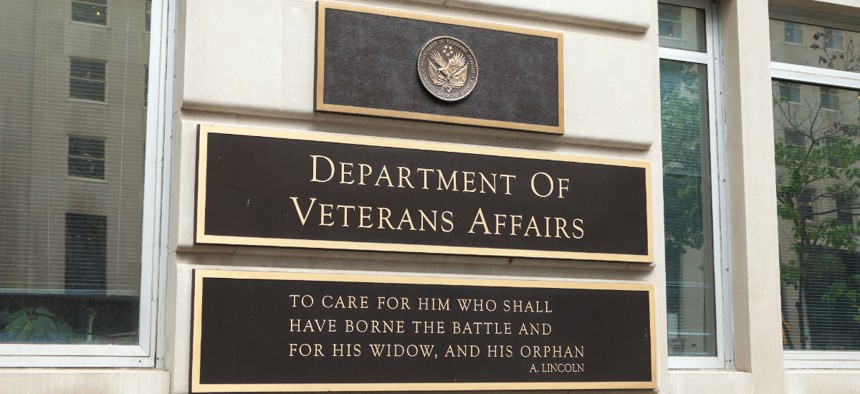
Mark Van Scyoc / Shutterstock.com
Largest Federal Employee Union Files Contempt Motion Against VA
AFGE accuses the department of refusing to comply with a court ruling enjoining provisions of President Trump’s workforce executive orders.
The nation’s largest federal employee union on Wednesday night filed a motion in the U.S. District Court for the District of Columbia to declare that the Veterans Affairs Department is in contempt of a recent court order invalidating President Trump’s executive orders aimed at cracking down on labor groups.
The American Federation of Government Employees filed the motion on behalf of AFGE Local 3399, which represents employees at the Harry S. Truman Memorial Veterans’ Hospital in Columbia, Mo., claiming that department officials repeatedly ignored demands to roll back implementation of the key provisions of three executive orders that were struck down last month by U.S. District Court Judge Ketanji Brown Jackson.
Once VA issued an order to rescind offending elements of workplace policies, AFGE said department officials attempted to improperly retain a requirement that all union officials must receive permission prior to the use of official time.
In May, Trump issued three executive orders, which sought to make it easier to fire federal employees, set time limits and limit the scope of collective bargaining negotiations, and to severely curtail union officials’ use of official time, as well as the scope of topics that can be administratively aggrieved. But Jackson found that the key provisions of the orders amounted to an “evisceration” of unions’ ability to bargain collectively, in conflict with the 1978 Civil Service Reform Act.
According to Wednesday’s complaint, in the days following Jackson’s Aug. 25 ruling, union officials repeatedly requested the department return its union and workplace policies to their pre-executive order state. In one instance, on Aug. 29, in response to an email stating that the facility is “in violation” of the court order and Office of Personnel Management guidance rescinding executive order implementation instructions, VA Supervisory Human Resources Specialist David Doler responded, “What is Local 3399’s question?”
On Aug. 31, VA issued a memo rescinding most of its policies implementing the executive order, but it maintained a requirement that union officials obtain permission through the VA Time and Attendance System (VATAS) for any official time request in advance.
“Because of the District Court’s order, the Office of Labor Management Relations will be rescinding the notice sent to AFGE on July 18, 2018, except with respect to any provisions regarding the implementation and enforcement of VATAS,” VA wrote. “[The] court’s order does not affect the [policy] on the use of VATAS for requesting, approving, recording and tracking of taxpayer funded union time.”
The AFGE local accused management at the VA facility of using that system to prevent union employees from performing representational duties.
“[Truman Memorial Veterans Hospital Director David Isaacks], Mr. Doler, and the leadership [of the facility] have abused the VATAS tracking system to unlawfully deny requests for official time in contempt of this court’s order,” the union wrote. “Through September 12, 2018, the agency refused to release certain union officials, including the chief steward, Mr. Aaron G. McMahon, to a standard Monday through Friday daytime work schedule as required by [an existing agreement].”
In that instance, McMahon was scheduled to present a grievance to department management on Sept. 10, but he was repeatedly denied requests for official time. Later that day, he was told that the window to present a grievance in person had closed.
“Mr. Doler emailed Mr. McMahon to say that the official assigned by Director Isaaks was no longer available for an in-person meeting and the local must now submit any support for their grievance in writing,” the union wrote, noting that its contract with the agency requires grievance meetings to be “face-to-face.”
In her court decision, Jackson wrote that requiring preapproval of official time is particularly problematic.
“Insofar as the official time order also generally requires agency management to pre-approve union representatives’ use of official time, one could argue that this singular provision is the one that does the most damage to the statutory right to bargain that the [law] establishes,” she wrote. “This is so because requiring preapproval effectively confers upon management the discretion to dictate when, if ever, union employees may use paid time to engage in union activities.”
Attorneys with the Justice Department disputed the contempt motion, arguing that AFGE Local 3399 failed to meet and confer with the government to try to resolve the issue before filing its motion. It also criticized AFGE for filing its contempt motion at “11:13 p.m. on Wednesday, September 19, 2018—without the barest effort to confer with defendants’ counsel beforehand.”
The Justice Department wrote: “According to AFGE 3399’s motion, the underlying dispute has been developing since at least August 27, 2018, when local union officials began corresponding with local management following this court’s summary judgment decision and order. Yet at no point during that process did AFGE 3399 counsel reach out to defendants’ counsel to discuss the local dispute.”







